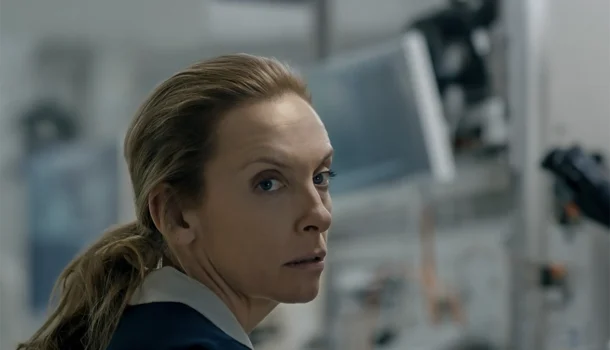While science fiction often leans on the extraordinary as visual spectacle, Joe Penna opts for a more abrasive and cerebral dive into the ethical and emotional possibilities awakened by space exploration. “Stowaway” shifts the axis of adventure toward uncertainty, anchoring its narrative in a gravity that is both literal and symbolic — pulling its characters into dilemmas as dense as the vacuum surrounding them. Rather than glorify galactic traversal, Penna destabilizes the idealism of exploration, choosing instead to ask what price sustains the dream of crossing physical and moral frontiers.
The story begins with a familiar setup — three astronauts en route to Mars — but subverts expectations by disrupting the mission with an unforeseen variable: the unauthorized presence of a fourth passenger. Michael Adams’s arrival unbalances the numerical and existential structure of the crew, pushing them into a discomfort zone where calculation and compassion clash. Zoe Levenson (Anna Kendrick) embodies the tension between empathy and logic. David Kim (Daniel Dae Kim) clings to mathematics as an emotional buffer. Marina Barnett (Toni Collette), in turn, embodies the command hierarchy, burdened with the weight of the final decision. This triangular tension resonates in performances that, though uneven at times, uphold the emotional core of the story.
Penna and Ryan Morrison, who co-wrote the screenplay, do not confine themselves to functional storytelling. What starts as a survival drama gradually transforms into an essay on sacrifice, collective responsibility, and the fragility of convictions when exposed to the unpredictable. Unlike many genre films that rely on external threats or technological failure for tension, the conflict here is internal — the characters themselves become the moral labyrinth that cannot be escaped through engineering, only through surrender.
Klemens Becker’s cinematography amplifies this silent claustrophobia: the ship’s corridors are not only physically narrow, but symbolically suffocating. Harsh metallic lighting doesn’t soften their anxieties; it lays them bare. The cold color palette — dominated by blues, grays, and greens — articulates emotional isolation with a restraint that avoids sentimentality. Even the ship’s design, functional to the edge of austerity, contributes to the portrayal of a mission that doesn’t aim for heroism, but for stripped-down survival.
Though comparisons to “2001: A Space Odyssey” are inevitable, they serve more as contrast than competition. Where Kubrick elevates humanity to cosmic enigma, Penna compresses it to its ethical threshold — no silent deity here, only the conscience as judge. In this sense, the absence of Kubrick’s formal brilliance is offset by a moral unease that seeks not applause, but disquiet. The strength of “Stowaway” lies precisely in its refusal to be grand: it chooses discomfort over catharsis, dilemma over redemptive resolution.
With strategic silences and deliberate pacing, Penna crafts a film that invites contemplation rather than thrill. This is a cinema that rejects haste, dismantles expectations of spectacle, and embraces slowness as a means of emotional suffocation. What’s at stake isn’t the conquest of Mars, but the cost of human presence where it perhaps doesn’t yet belong. Its refusal to offer easy answers or narrative comfort transforms the film into a rigorous study of the weight of a decision no one wanted to make — yet one that must still be borne.
Film: Stowaway
Director: Joe Penna
Year: 2021
Genres: Sci-Fi/Thriller/Drama
Rating: 8/10

